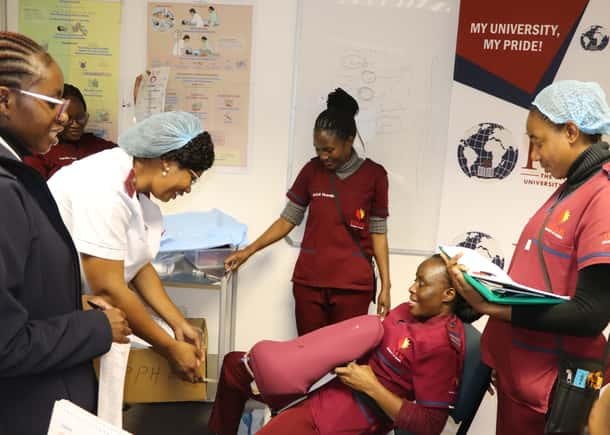BOGO Story: Successful Post-partum hemorrhage training in Namibia


As part of a recent Buy One Gift One initiative in collaboration with the International Confederation of Midwives, MamaNatalie birthing simulators and Helping Mothers and Babies Survive educational materials were allocated to high-impact projects worldwide. One of the recipients was a project to train midwives, nurses, interns, and medical officers in Namibia.
Post-partum hemorrhage (PPH) is a leading cause of maternal deaths globally, with Namibia reporting a maternal mortality rate of 139 per 100,000 live births (WHO, April 2025), well above the Sustainable Development Goal (SDG 3) target reduction to 70 per 100,000 by 2030.
To address this challenge, a two-day clinical training workshop, “Bleeding After Birth Complete,” was conducted in early July 2025 at Windhoek Central Hospital and Katutura Intermediate Hospital. The training, facilitated by midwifery educators from the International University of Management (IUM), aimed to strengthen the capacity of healthcare workers in managing PPH.
The workshop focused on providing participants with knowledge and practical hands-on skills, including:
The Buy One Gift One program has allowed us to bring together healthcare workers from multidisciplinary teams, which has greatly strengthened teamwork and collaboration during simulation training. Importantly, we have also integrated the principles of Respectful Maternity Care into the sessions, particularly in teaching the management of postpartum hemorrhage. This approach not only enhances clinical skills but also ensures that the care provided is compassionate, dignified, and centred on the needs of mothers and their families.
Participants reported increased confidence in managing PPH emergencies. They also reported strengthened teamwork and communication, as well as an improved understanding of low-cost, high-impact interventions, all while adhering to the Respectful Maternity Care approach. Long-term impact is expected to be seen in improved maternal outcomes through reduced morbidity and mortality associated with postpartum haemorrhage.
PPH is one of the trainings we hardly receive in the hospital, so it was wonderful that we got a chance to actively learn how to appropriately manage post-partum hemorrhage … I would recommend that we have this training at least 3 times a year for new interns to learn and the nurses to refresh their skills.
The training was so well-received that recommendations are being made to institutionalize regular obstetric emergency low-dose high-frequency training and integration of PPH management into in-service training. In addition, a request for Continuous Professional Development (CPD) accreditation has been submitted to recognize the efforts of both facilitators and participants in advancing maternal healthcare.
This impactful training is expected to contribute to improved maternal health outcomes in Namibia and to progress toward national and global goals aimed at reducing maternal mortality rates. The initiative was supported by the International Confederation of Midwives (ICM), Laerdal Global Health, the Independent Midwives Association of Namibia (IMANA), and IUM. This collaboration is a commitment to reducing maternal health disparities by empowering healthcare workers with lifesaving training in places where they’re needed most.